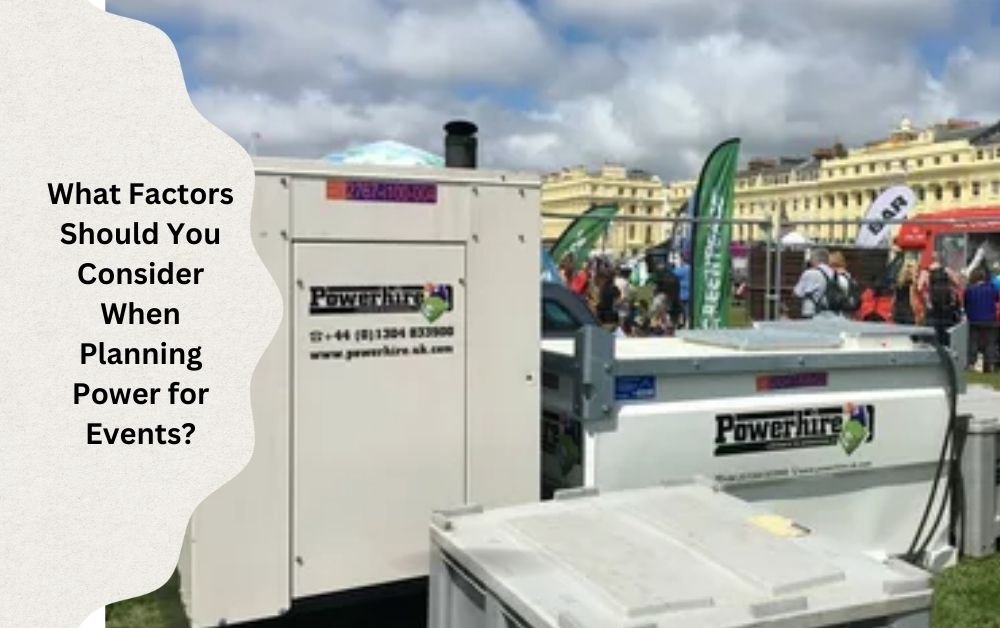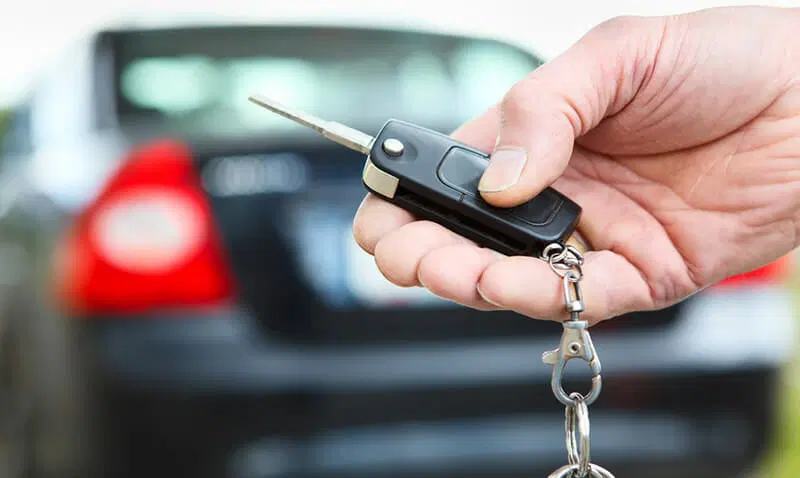Planning an event, whether it’s a small wedding or a large-scale festival, involves many important aspects, and one of the most crucial is ensuring a reliable power supply. Without the right power setup, even the most well-organized event can face significant problems, including equipment failure, lighting issues, and sound disruptions. Power planning might seem like a technical detail, but it plays a vital role in the smooth operation of any event.
In this blog, we will explore the key factors you should consider when planning power for your event. By understanding these factors, you can ensure that your event runs smoothly without any interruptions or unexpected power issues.
Table of Contents
ToggleUnderstanding the Power Needs of Your Event
The first step in planning power for an event is to understand exactly how much power your event will need. Different types of events require different amounts of electricity, depending on the equipment and services involved. For example, a small outdoor wedding may only need basic lighting and sound, while a large concert will require power for lighting, sound systems, stage equipment, and potentially food vendors.
Note: When planning outdoor or large-scale gatherings, reliable Power for events is crucial for smooth operations. Whether you need temporary generators or backup systems, finding the right solution ensures your event runs without interruption. Sahara Equipments offers power solutions tailored to your specific event needs. Reach out to Sahara Equipments to ensure your next event has the energy it requires for success.
Assessing Your Event’s Power Requirements
- List of Equipment: Make a detailed list of all the equipment that will need power during your event. This can include lighting, sound systems, catering equipment, projectors, and charging stations.
- Power Consumption: Determine how much power each piece of equipment will consume. Equipment like large speakers, lighting rigs, and video screens can consume significant amounts of energy.
- Peak Power Usage: Consider the times when your event will require the most power, known as peak power usage. This often occurs during the main activities or performances.
Understanding your power needs will help you plan for the right amount of electricity and avoid overloading the system, which could lead to power outages.
Choosing the Right Power Sources for Your Event
Once you have assessed your event’s power requirements, the next step is choosing the right power sources. Events can rely on various types of power, including mains electricity, generators, or renewable sources like solar panels. The type of power source you choose will depend on the location of your event and its specific needs.
Types of Power Sources
- Mains Electricity: For events held in locations with easy access to an electrical grid, mains electricity may be the most convenient option. However, it’s essential to ensure that the venue can provide enough power to meet your event’s needs.
- Generators: For outdoor or remote events, generators are often necessary to supply electricity. Generators come in different sizes and capacities, so it’s important to choose one that can handle the power demands of your event.
- Renewable Energy: For environmentally conscious events, renewable energy sources like solar panels can provide power. However, this option may require additional planning and equipment.
Choosing the right power source ensures that your event has a reliable supply of electricity throughout the duration of the event.
Ensuring Backup Power for Emergency Situations
Even with careful planning, power issues can arise unexpectedly during an event. Weather conditions, equipment malfunctions, or increased power demands can cause disruptions that may affect the success of your event. This is why having a backup power plan is crucial.
Why Backup Power is Important
- Uninterrupted Operations: Backup power ensures that your event can continue smoothly, even if the main power source fails. This is especially important for events with large audiences, critical activities, or safety concerns.
- Safety and Security: In the event of a power outage, backup power can keep lighting and security systems running, ensuring the safety of attendees.
- Minimal Disruption: Having a backup power source, such as an additional generator or battery system, minimizes disruptions and keeps the event on track.
Planning for backup power might involve renting additional generators or ensuring that your main power source has sufficient capacity to handle emergencies.
Understanding the Location and Accessibility of Power
Another key factor in planning event power is understanding the location where your event will take place. The venue or site’s accessibility to power sources plays a major role in determining how electricity will be supplied and distributed throughout the event.
Venue Considerations
- Access to Power Outlets: For indoor events, check how many power outlets are available and their location. You may need to bring extension cords or additional equipment to ensure that power is distributed evenly.
- Outdoor Events: If your event is outdoors or in a remote location, you will likely need generators to supply electricity. In such cases, you will also need to consider where the generators will be placed to minimize noise and disruption.
- Weather Conditions: For outdoor events, weather conditions like rain or high winds can affect power setups. Make sure that all electrical equipment is weatherproofed and that generators are placed in sheltered areas if necessary.
By planning around the location, you can ensure that your power setup is efficient and meets the needs of your event.
Managing Power Distribution for Different Event Zones
At most events, there are multiple zones or areas that require power. For example, a large concert may have a stage area, food vendors, and a seating area, all of which need electricity for different purposes. Properly managing power distribution across these zones is important to ensure that no area is left without the power it needs.
Effective Power Distribution
- Power Distribution Units (PDUs): PDUs are used to distribute power from a single source to multiple devices or areas. They can help ensure that power is supplied evenly to all parts of your event.
- Cabling: Running cables between power sources and different areas of the event requires careful planning. Make sure that cables are placed safely and are protected from damage or tampering.
- Load Balancing: Load balancing ensures that no single power source is overloaded. By distributing the electrical load evenly across different areas, you can avoid power failures or interruptions.
Planning for power distribution ensures that every part of your event receives the electricity it needs to operate smoothly.
Working with Professional Power Providers
While you can plan much of the power setup for your event yourself, working with professional power providers is highly recommended. These experts have experience in managing power for events and can help ensure that everything runs smoothly.
Benefits of Hiring Professionals
- Expertise in Power Management: Professional power providers understand the technical details of power distribution, generator sizing, and safety. They can recommend the best equipment and setup for your event.
- On-Site Support: Many power companies offer on-site support during the event to handle any issues that arise and ensure that everything continues running smoothly.
- Customized Solutions: Power needs can vary greatly depending on the type of event, and professionals can provide customized solutions tailored to your specific requirements.
By working with experienced professionals, you can focus on other aspects of event planning, knowing that the power supply is in good hands.
Planning for Sustainable Power Solutions
As sustainability becomes more important in event planning, many organizers are looking for ways to reduce the environmental impact of their events. This includes finding more eco-friendly power solutions.
Sustainable Power Options
- Solar Power: Solar panels can be used to provide electricity for events, especially in sunny locations. While this option may require more planning, it can significantly reduce the event’s carbon footprint.
- Energy-Efficient Equipment: Using energy-efficient lighting, sound systems, and other equipment can reduce overall power consumption and help make the event more sustainable.
- Hybrid Generators: Hybrid generators that combine traditional fuel sources with renewable energy can provide a more sustainable power solution for events.
Planning for sustainable power options not only helps the environment but also enhances the reputation of your event as being eco-conscious.
Conclusion: Careful Power Planning Is Key to a Successful Event
Power planning is one of the most important aspects of organizing a successful event. Whether you are hosting a small gathering or a large-scale festival, having the right power setup ensures that all equipment functions properly and that attendees enjoy a seamless experience.
By considering factors such as your event’s power needs, choosing the right power sources, ensuring backup power, and working with professionals, you can create an effective power plan that keeps your event running smoothly from start to finish.
For More Insightful Articles Related To This Topic, Feel Free To Visit: nytimer.




